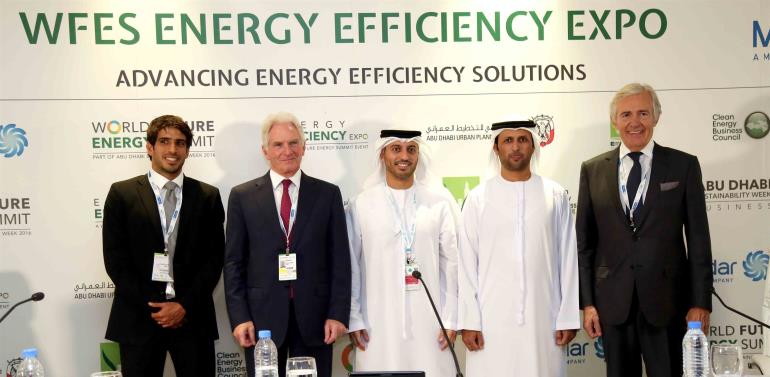International
Global energy efficiency investment opportunity of nearly $6 trillion by 2030: IRENA

To meet the region’s rapid energy growth, with the Middle East and North Africa’s energy demand set to double by 2030, the Middle East requires $555 billion in total energy infrastructure investment by 2030, according to a recent report by NBAD, University of Cambridge, and PWC.
Energy efficiency in buildings, transportation, and manufacturing will play a key role – by replacing fossil fuels with renewable energy, improving electricity access and reliability, and reducing pollution, which in turn support economic growth, while benefitting society and the environment.
Anticipating the growing demand for energy efficiency solutions in the region, the WFES Energy Efficiency Expo 2017 is set to be a new annual, co-located exhibition, conference, and business matchmaking program in the energy efficiency sector at Abu Dhabi Sustainability Week, hosted by Masdar.
The WFES Energy Efficiency Expo is set to further elevate Abu Dhabi Sustainability Week as a global platform addressing the interconnected challenges and opportunities of sustainable development and clean energy.
“Sustainable development requires efficient management of energy demand as well as supply, and the Middle East and North Africa is no exception,” said Dr Ahmad Belhoul, Chief Executive Officer of Masdar, Abu Dhabi’s renewable energy company. “At the WFES Energy Efficiency Expo 2017, we will share our public-private partnerships in energy conservation, including the role of Masdar City, Abu Dhabi’s ‘green-print’ for sustainable urban design which consumes 40 percent less water and energy than city developments of a comparable size,” he stated.
“It will also be an opportunity to showcase innovations such as Future Build, an online platform to help architects, engineers and contractors source environmentally responsible building materials and products that have been independently assessed. The Energy Efficiency Expo will encourage further collaboration and entrepreneurship at the intersection of water and energy, promoting the business case for sustainability,” added Dr Ahmad Belhoul.
Eng. Abdulla Al Shamsi, Executive Director, Strategic Affairs Sector, Abu Dhabi Urban Planning Council (UPC), said, “Sustainability is one of the guiding principles of Abu Dhabi Vision 2030 and as such lies at the heart of the UPC’s objectives for the development of the Emirate. We see energy efficiency in buildings as a vital factor in supporting Abu Dhabi to meet its current and future energy demands. Over the past five years, through the Estidama program of sustainability, has rated the Emirate’s real estate developments based on a range of factors, including energy efficiency, using the mandatory Estidama Pearl Rating System. As strategic partners of this event, we look forward to sharing our knowledge and experience of best practice sustainability processes, tools and techniques with delegates at the WFES Energy Efficiency Expo in 2017.”
“Estidama is Abu Dhabi Government’s official program for developing a sustainable Emirate for the benefit of its citizens. Since its launch in 2008, it has gained international recognition, and we believe the WFES Energy Efficiency Expo offers a great platform to engage with a diverse audience and further enhance awareness of Estidama on a global scale,” he added.
In the Middle East, the UAE and Kingdom of Saudi Arabia are leaders in energy efficiency, with the UAE recently revising fuel subsidies in line with global indices, and the Kingdom of Saudi Arabia aiming to improve energy efficiency for new vehicles by 20 per cent and air conditioners by 35 per cent to 2020, according to the IRENA report.
“With buildings consuming 80 per cent of the UAE’s electricity, energy-efficient buildings have one of the highest potentials to reduce carbon emissions and energy costs. The WFES Energy Efficiency Expo will be a landmark event to drive new business opportunities in energy efficiency projects, which not only provide favorable returns on investment but also contribute positively to the environment. As an independent forum aimed at promoting energy efficiency, Emirates Green Building Council is proud to be an event partner,” said Saeed Al Abbar, Chairman, Emirates Green Building Council.
-

 News2 months ago
News2 months agoAI Security Conference 2025 Hosted by Securado Highlights the Changing Cybersecurity Landscape
-

 Insurance2 months ago
Insurance2 months agoSupporting Community Wellness: Liva Insurance Sponsors Muscat Marathon 2026 with Free Health Checkups
-

 Interviews1 month ago
Interviews1 month agoEXCLUSIVE INTERVIEW: TLS Rebranding Marks Strategic Leap Toward Innovation, Sustainability & Growth
-

 Insurance1 month ago
Insurance1 month agoLiva Insurance Supports Community Wellness Through “Experience Oman – Muscat Marathon 2026”
-

 Dossier6 days ago
Dossier6 days agoDossier, 2026
-

 Investment3 weeks ago
Investment3 weeks agoLalan Inaugurates Its First Overseas Manufacturing Facility, Marking Sri Lanka’s First Investment in SOHAR Freezone
-

 Banking & Finance7 days ago
Banking & Finance7 days agoNational Finance Unveils Exclusive Ramadan Offers on Auto Financing
-

 Food & Dining3 weeks ago
Food & Dining3 weeks agoGrand Millennium Muscat’s exclusive Ramadan Iftar and Suhoor Experiences





























You must be logged in to post a comment Login